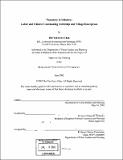| dc.contributor.advisor | Karen R. Polenske. | en_US |
| dc.contributor.author | Chan, Hoi-Yan Erica, 1975- | en_US |
| dc.contributor.other | Massachusetts Institute of Technology. Dept. of Urban Studies and Planning. | en_US |
| dc.date.accessioned | 2011-08-01T14:34:22Z | |
| dc.date.available | 2011-08-01T14:34:22Z | |
| dc.date.copyright | 2002 | en_US |
| dc.date.issued | 2002 | en_US |
| dc.identifier.uri | http://hdl.handle.net/1721.1/65062 | |
| dc.description | Thesis (M.C.P.)--Massachusetts Institute of Technology, Dept. of Urban Studies and Planning, 2002. | en_US |
| dc.description | Includes bibliographical references (p. 146-151). | en_US |
| dc.description.abstract | This study examines the symbiotic relationship between labor relations and the resilience and performance of regional economies. I hypothesize that the institutional structure of the recent phenomenon of Chinese Township and Village Enterprises (TVEs) creates opportunities for industrial labor relations that contribute to their economic performance. I conduct two case studies, first the experiences of the Monongahela (Mon) Valley steel industry in the United States in the mid-1980s and then the more recent experiences of the Shanxi Province cokemaking sector in rural China in the late-1990s to early 2000s. They illustrate the mechanisms through which the cultural, social, economic and industrial environments influence labor market practices, which in turn affect the regional economy. I propose that sour labor relations were partly responsible for the economic and social deterioration of the Mon Valley. Then, I claim that the unique institutional environments in which Chinese TVEs operate are conducive to positive labor-management relations and labor practices that render these enterprises competitive in the global economy. An agrarian culture, the prevalence of dense social networks in the form of guanxi, and the nature and structure of the firms all contribute to the Shanxi Cokemaking TVEs' competitive advantage. To conduct this study, I review existing literature and research studies, official statistics, as well as use empirical plant-level survey data and make site visits. I conclude that there is room for experimental labor relations that can be growth and labor-friendly. As a developing country, China has much to learn from the industrialization and de-industrialization processes of her Western counterparts, such as the United States. At the same time, U.S. management and workers may also benefit from learning about the TVE experience. The deep-seeded social capital and emphasis on long-term harmonious relationships should allow Chinese management and workers in the quickly industrializing countryside to create an innovative, cooperative forum of interactions. | en_US |
| dc.description.statementofresponsibility | by Hoi-Yan Erica Chan. | en_US |
| dc.format.extent | 151 p. | en_US |
| dc.language.iso | eng | en_US |
| dc.publisher | Massachusetts Institute of Technology | en_US |
| dc.rights | M.I.T. theses are protected by
copyright. They may be viewed from this source for any purpose, but
reproduction or distribution in any format is prohibited without written
permission. See provided URL for inquiries about permission. | en_US |
| dc.rights.uri | http://dspace.mit.edu/handle/1721.1/7582 | en_US |
| dc.subject | Urban Studies and Planning. | en_US |
| dc.title | Peasantry to industry : labor and Chinese cokemaking township and village enterprises | en_US |
| dc.type | Thesis | en_US |
| dc.description.degree | M.C.P. | en_US |
| dc.contributor.department | Massachusetts Institute of Technology. Department of Urban Studies and Planning | |
| dc.identifier.oclc | 50856108 | en_US |
